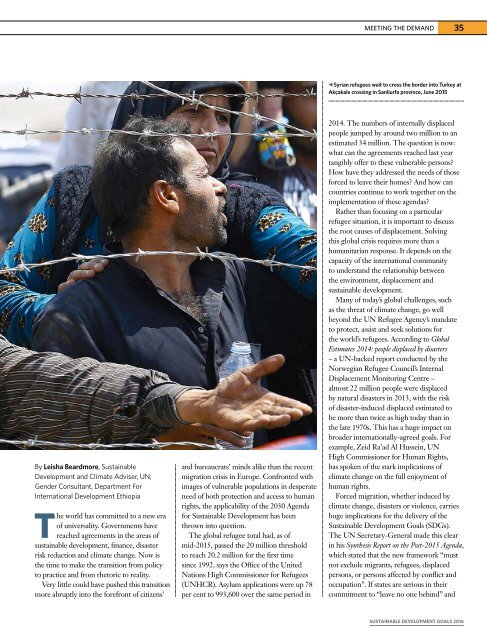DEVELOPMENT GOALS
1RK35Su
1RK35Su
You also want an ePaper? Increase the reach of your titles
YUMPU automatically turns print PDFs into web optimized ePapers that Google loves.
MEETING THE DEMAND<br />
35<br />
Syrian refugees wait to cross the border into Turkey at<br />
Akçakale crossing in Sanliurfa province, June 2015<br />
By Leisha Beardmore, Sustainable<br />
Development and Climate Adviser, UN;<br />
Gender Consultant, Department For<br />
International Development Ethiopia<br />
The world has committed to a new era<br />
of universality. Governments have<br />
reached agreements in the areas of<br />
sustainable development, finance, disaster<br />
risk reduction and climate change. Now is<br />
the time to make the transition from policy<br />
to practice and from rhetoric to reality.<br />
Very little could have pushed this transition<br />
more abruptly into the forefront of citizens’<br />
and bureaucrats’ minds alike than the recent<br />
migration crisis in Europe. Confronted with<br />
images of vulnerable populations in desperate<br />
need of both protection and access to human<br />
rights, the applicability of the 2030 Agenda<br />
for Sustainable Development has been<br />
thrown into question.<br />
The global refugee total had, as of<br />
mid-2015, passed the 20 million threshold<br />
to reach 20.2 million for the first time<br />
since 1992, says the Office of the United<br />
Nations High Commissioner for Refugees<br />
(UNHCR). Asylum applications were up 78<br />
per cent to 993,600 over the same period in<br />
2014. The numbers of internally displaced<br />
people jumped by around two million to an<br />
estimated 34 million. The question is now:<br />
what can the agreements reached last year<br />
tangibly offer to these vulnerable persons?<br />
How have they addressed the needs of those<br />
forced to leave their homes? And how can<br />
countries continue to work together on the<br />
implementation of these agendas?<br />
Rather than focusing on a particular<br />
refugee situation, it is important to discuss<br />
the root causes of displacement. Solving<br />
this global crisis requires more than a<br />
humanitarian response. It depends on the<br />
capacity of the international community<br />
to understand the relationship between<br />
the environment, displacement and<br />
sustainable development.<br />
Many of today’s global challenges, such<br />
as the threat of climate change, go well<br />
beyond the UN Refugee Agency’s mandate<br />
to protect, assist and seek solutions for<br />
the world’s refugees. According to Global<br />
Estimates 2014: people displaced by disasters<br />
– a UN-backed report conducted by the<br />
Norwegian Refugee Council’s Internal<br />
Displacement Monitoring Centre –<br />
almost 22 million people were displaced<br />
by natural disasters in 2013, with the risk<br />
of disaster-induced displaced estimated to<br />
be more than twice as high today than in<br />
the late 1970s. This has a huge impact on<br />
broader internationally-agreed goals. For<br />
example, Zeid Ra’ad Al Hussein, UN<br />
High Commissioner for Human Rights,<br />
has spoken of the stark implications of<br />
climate change on the full enjoyment of<br />
human rights.<br />
Forced migration, whether induced by<br />
climate change, disasters or violence, carries<br />
huge implications for the delivery of the<br />
Sustainable Development Goals (SDGs).<br />
The UN Secretary-General made this clear<br />
in his Synthesis Report on the Post-2015 Agenda,<br />
which stated that the new framework “must<br />
not exclude migrants, refugees, displaced<br />
persons, or persons affected by conflict and<br />
occupation”. If states are serious in their<br />
commitment to “leave no one behind” and<br />
SUSTAINABLE <strong>DEVELOPMENT</strong> <strong>GOALS</strong> 2016


